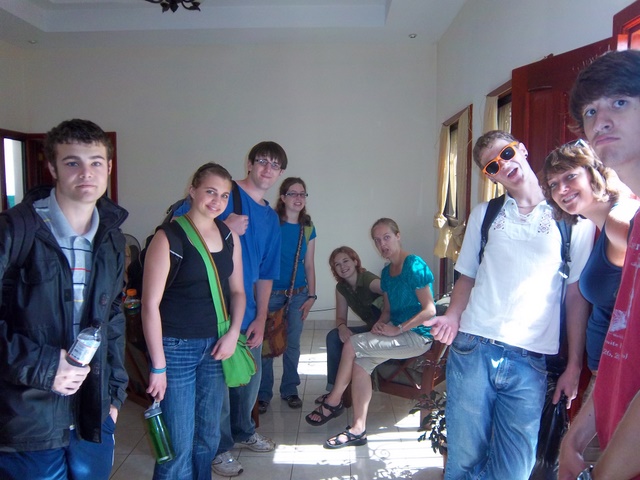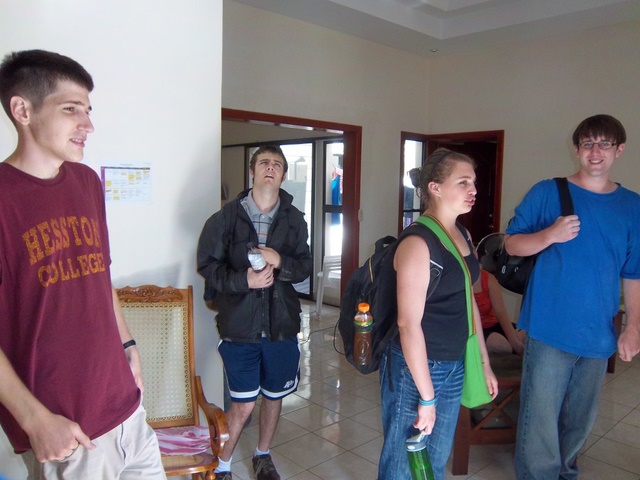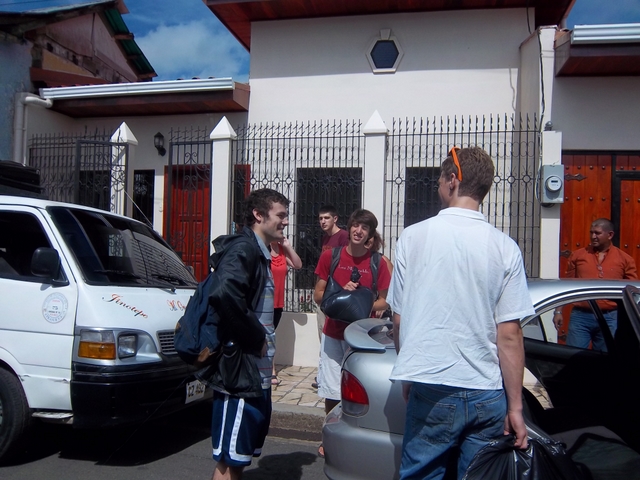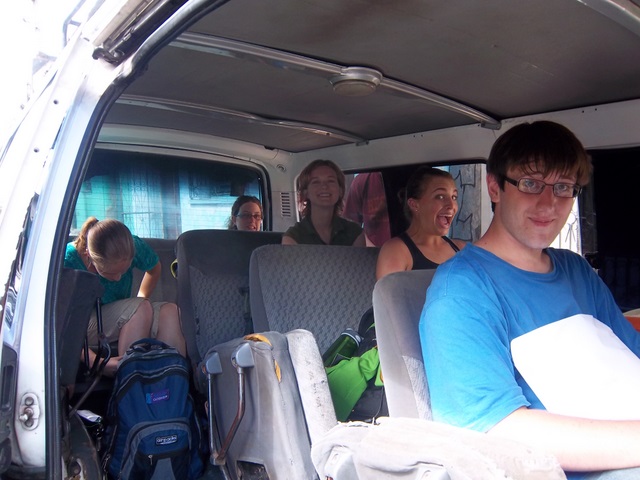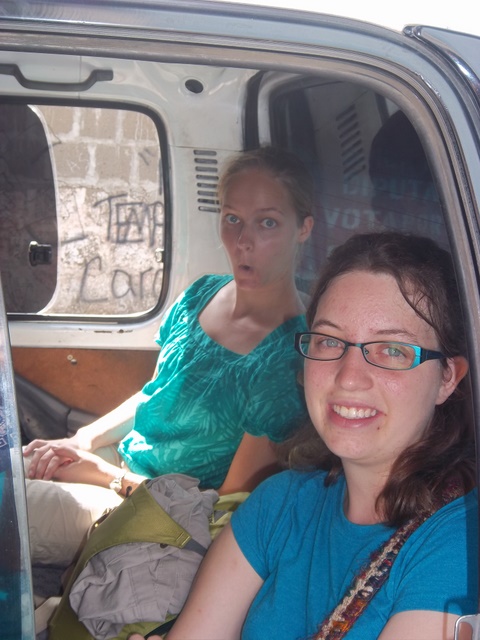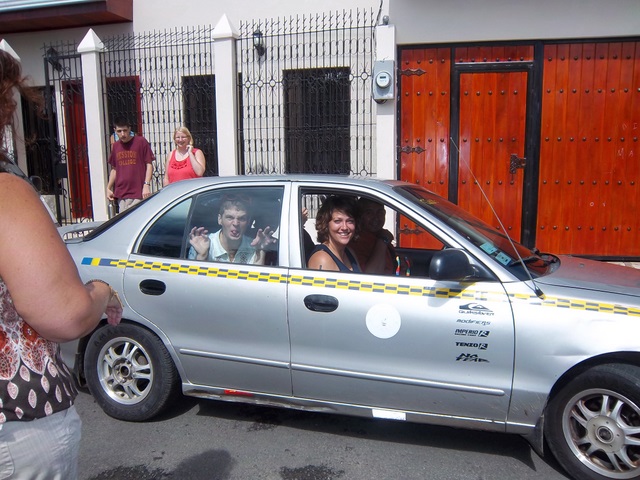We’re off to service!
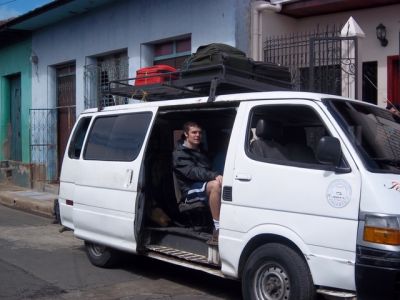
Last Friday morning we officially ended the “study” portion of the study-service term and sent the students off to new places to begin their service projects. By early afternoon we had received word that everyone made it safely to their destinations. All was quiet (and even a bit lonely) around here on Sunday, as we imagined the students settling into their new locations and getting acquainted with their surroundings and family members.
Sarah and Hannah went to Estelí, where they will be working at Mujeres Ambientalistas [Environmentalist Women], the paper-making cooperative we visited during our trip north several weekends ago. They’ll be helping make paper products, working in the collective garden, and assisting with workshops for women and children.
Kaleb and Jacob are in Matagalpa and will be working at Infancía sin Fronteras [Children without Limits], a multi-country nongovernmental organization that focuses on social awareness, humanitarian aid and community development. Kaleb and Jacob will help with an after school program aimed at expanding children’s knowledge of art, music, drama, and dance as well as practical skills such as sewing, carpentry, and computer competencies.
Mandi is also in Matagalpa, working at the Centro de Recuperación Nutricional [Nutritional Recuperation Center], a residential facility that cares for severely malnourished children. Many of these children are transferred to the center from local hospitals, which treat them for conditions such as pneumonia and diarrhea but cannot provide the special care and long-term rehabilitation necessary for complete recovery. Without such treatment, many of these children eventually may die of starvation or complications from any number of common illnesses that their weakened immune systems aren’t able to circumvent. Mandi will be helping with the care and feeding of these children and also may be assisting with a free lunch program the center offers for street children.
Closer to Carazo are Brian, Amanda and Nathaniel, who will be working at the Estación Biologica [Biological Research Station] at Laguna de Apoyo. They’ll be helping with reforestation and also monitoring flora and fauna in the tropical dry ecosystem of this 23,000-year old volcanic crater. Declared a nature reserve in 1991, this area features dense vegetation, steep slopes, and a wide variety of plants, mammals, birds, butterflies, moths, fish and mollusks. Dr. Jeffrey McCrary, director of the station, was quoted recently in a New York Times article about the environmental hazards of tilapia (fish) farming in developing countries.
Also nearby is Jacy, who will be working at the Escuela Gabriela Mistral, a grade school in Barrio Grenada, the the Managua community where we did our mini-service project during the students’ first week in Nicaragua. Jacy will help in the classroom and in the newly completed library, which will be inaugurated this Wednesday.
Austin and Katie are staying in Carazo but will be traveling each day to work at Gaia Estate, an organic shade-grown coffee farm located several kilometers outside of nearby Diriamba. (The group visited this farm during our final week of study.) Founded five years ago by North American Jefferson Shriver and his Nicaraguan wife, Gabriela Narvaez, this 90-acre is certified Bird-Friendly® by the Smithsonian Migratory Bird Center and was featured in last month’s Bird Watcher’s Digest. Katie and Austin will help with a variety of tasks, from trail-building and pruning to caring for the farm’s horse to assisting with signage, ideas and future plans for academic programming and eco-tourism around food justice issues.
In preparation for their service assignments, we asked the students to read a brief but excellent blog post by Becca Mohally Renk, a long-term NGO worker in Nicaragua. Entitled “Too Hell with Good Intentions,” in this piece Mohally Renk reflects on what it means to volunteer in Nicaragua and the tendency of North Americans (herself included) to think they can “fix” everything that’s “wrong” with poorer countries. She quotes a 1968 address to volunteers in Mexico by Monseñor Ivan Illich, in which he challenges “the idea that every American has something to give, and at all times may, can and should give it.”
This is not a harsh condemnation of our efforts but rather a passionate call to walk alongside the Nicaraguan people and to learn from them. Often this means that simply “being” takes precedence over “doing.” For some this may be a new way of understanding and applying Goshen College’s core values of global citizenship and servant leadership. “Accompaniment means that we don’t call the shots,” writes Mohally Renk. “We strive toward – and oftentimes fail to reach – a voluntary powerlessness. This is hard. And it’s certainly not sexy. We try to learn. And we receive infinitely more than we can ever give…” We hope the students will take these insights to heart in the next six weeks.
Early in July we will begin visiting each of the service sites and reporting on the students’ activities. Until then we’ll be busy with the many details of curriculum review and evaluation, updating program information and catching up on journal-reading and grading. We’ll also be planning the final few days here in Nicaragua, when we’ll all be together as a group once again for final project presentations, debriefing and wrap-up. Of course, we’re hoping to enjoy a bit of R & R during this brief “empty nest” period as well.
Entonces, hasta Julio for more updates…
Co-leaders Lisa & Jen
